Passing the Menorah: A Hanukkah Story
From generation to generation, the light of the holiday carries forward
“A great miracle happened there.”
— Translation of four Hebrew letters on the sides of the Hanukkah dreidel.
As probably all the world knows by now, Christmas and Hanukkah both arrive this Wednesday. I’ve been literally up to my elbows in cookie dough and latke batter, and my family wonders what’s up with that. Why not go out for Chinese food and a movie and call it a day? But I can’t because, you know, I have a different tradition that comes with my immigrant legacy. So here’s a bit of background on why Hanukkah, usually considered a minor holiday, is so important to me.

When I was growing up in the 1950s on a quiet street in Palo Alto, California, ours was the only Jewish family on the block. Yet, when my friends started decorating Christmas trees and anticipating the quantities of gifts that would appear under them on December 25, I didn’t feel left out. We had our own holiday, Hanukkah, I proudly explained to my friends—and it lasted for eight days!
Hanukkah had certain things in common with Christmas: we exchanged gifts, and it was celebrated at approximately the same time of year. But there the similarities pretty much ended, at least in our household. Worried about assimilation, my father wouldn’t permit a Christmas tree, even if we designated it a “Hanukkah bush” and put blue lights on it. Nor were there pretty colored glass bulbs decorating the edge of the roof or the magnolia tree out front.
Instead, we lit candles on the menorah for eight nights, adding one more each evening as we sang about events that took place more than 2,000 years ago and are the story behind the holiday—the triumph of a small band of Jewish warriors, the Maccabees, over a far larger enemy that was threatening their faith. The “miracle” was that in the Jerusalem Temple, there was supposedly only enough oil to keep the lamp (menorah) lighted for a single day, but instead it burned for eight.
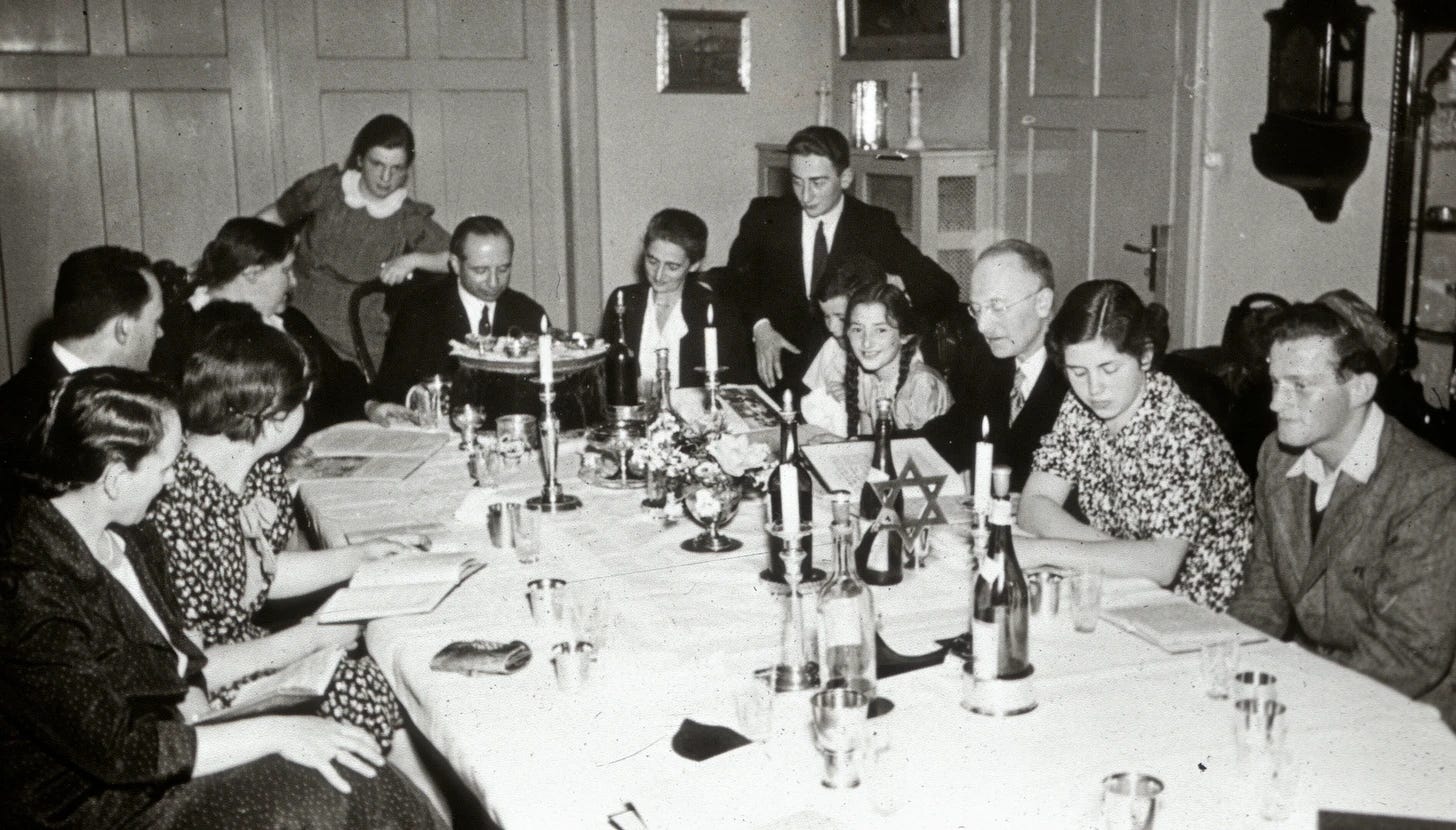
In my family, there was a particular resonance to this story of triumph against the odds, for my German-born father, his brother, three sisters and parents had fled their hometown and the Nazis during the 1930s and found haven in the United States, where they built new lives.
By the time I was born, my grandparents had settled in Berkeley, and their five children were married and raising families of their own. Eventually there would be 18 grandchildren, with all but two growing up in the Bay Area.
After my grandfather’s death in 1950, my grandmother, whom we called Oma, continued a holiday tradition that had begun in Germany, but grew much larger and more boisterous in America, partly in response to the enormous popularity of Christmas. Each year, at least one night of Hanukkah was celebrated at my grandmother’s Berkeley residence.

Aunts, uncles and cousins, ranging from babes-in-arms to teens and, as the years marched by, college students gathered around a large ornate menorah (that had traveled with them from Germany) as we said the prayers over the candles and sang songs retelling the Hanukkah story. An enormous feast was served at a long, white-linen-covered table running from one end of the living room to the other and laden with Oma’s best china—also somehow spirited out of Germany in late 1938 as the war clouds gathered and the plight of German Jews grew ever grimmer.
There were silver platters filled with chicken, beef, potatoes and vegetables, with rich cakes and chocolates for dessert. After dinner, the aunts and uncles would shoo away the younger generation while the gifts were piled on the dining room table, with name tags designating the recipients.
Then the grandchildren would finally be let in to fall upon the mountains of presents, with myriad pairs of hands ripping away at multicolored wrapping paper simultaneously amid shrieks of laughter and delight. In retrospect, I can’t remember a single present. I’d like to think it wasn’t the material pleasure of receiving all those gifts that was so meaningful, but instead the joy of celebrating with such a large extended family.
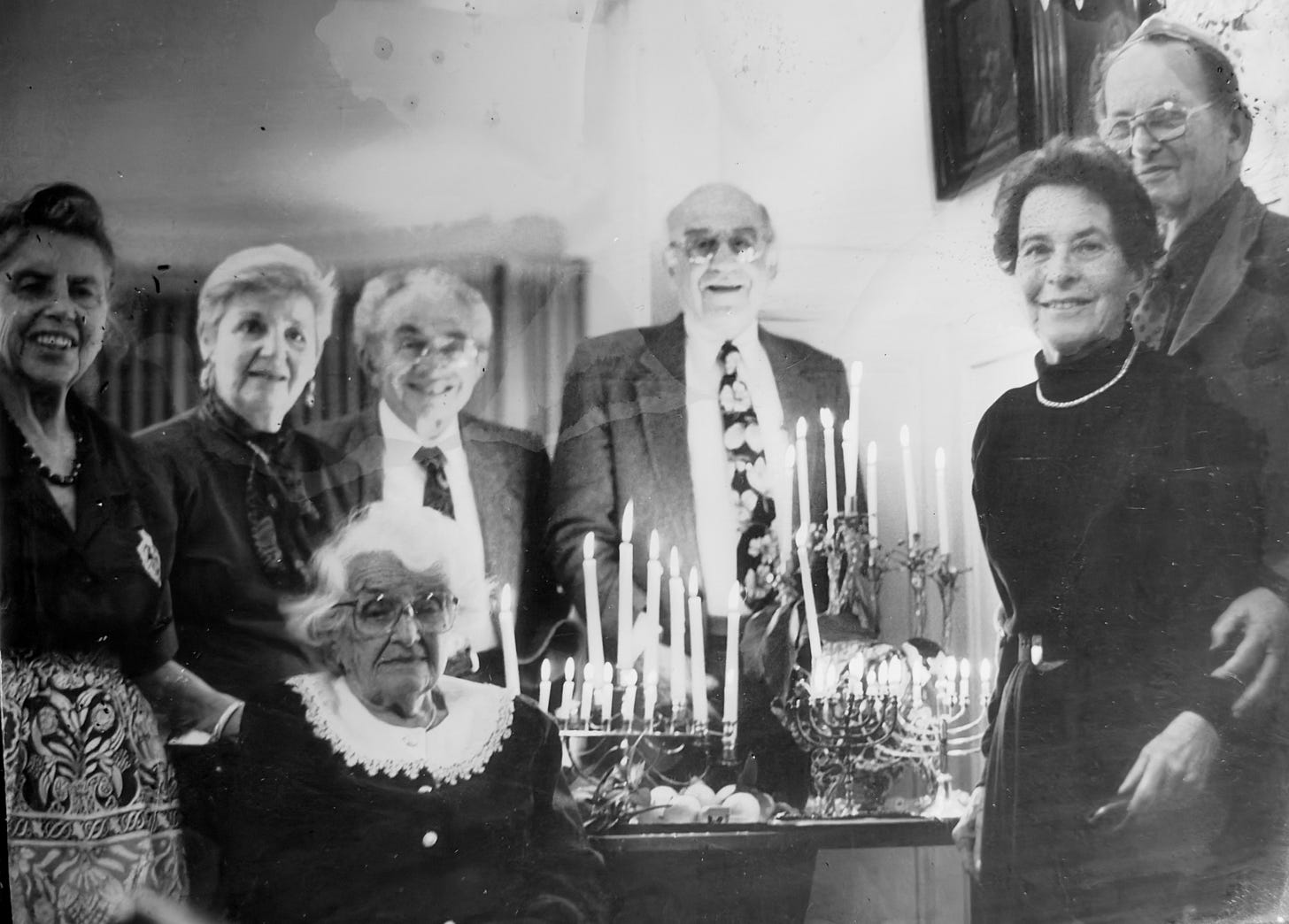
Later, after Oma passed away, the multigenerational celebration moved to the homes of her children and their spouses and included latkes, deep-fried potato pancakes that are of Eastern European origin and recall the miracle of the oil. When the grandchildren had all grown up and moved away, our aging parents continued to meet to celebrate Hanukkah together.
And now, in the blink of an eye, a quarter-century has passed and our parents, aunts and uncles, two of my cousins and my dear brother Michael have all passed away, and yet the Hanukkah memories, and, in many cases, the holiday gatherings, still endure among Oma’s grandchildren, and now even her great grandchildren, although, scattered as we are, the crowds are often smaller and composed of immediate relatives and friends rather than huge extended families. Still, the torch—or more appropriately, the menorah—has surely been passed to at least some of Oma’s 20 great-grandchildren and 14 great-great-granchildren. Like the legendary oil, traditions are hard to extinguish!
Happy Hanukkah, Merry Christmas and Happy Kwanzaa! Whatever you celebrate, may it bring you joy, and may the lights of these holidays at the darkest time of the year (at least in the western hemisphere) bring you peace and hope.
Thanks so much for reading, liking, commenting, sharing and subscribing. It means a lot!
See you soon.
Ruth

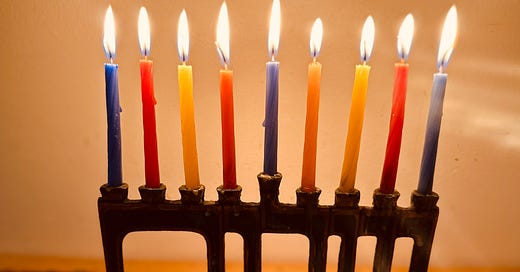

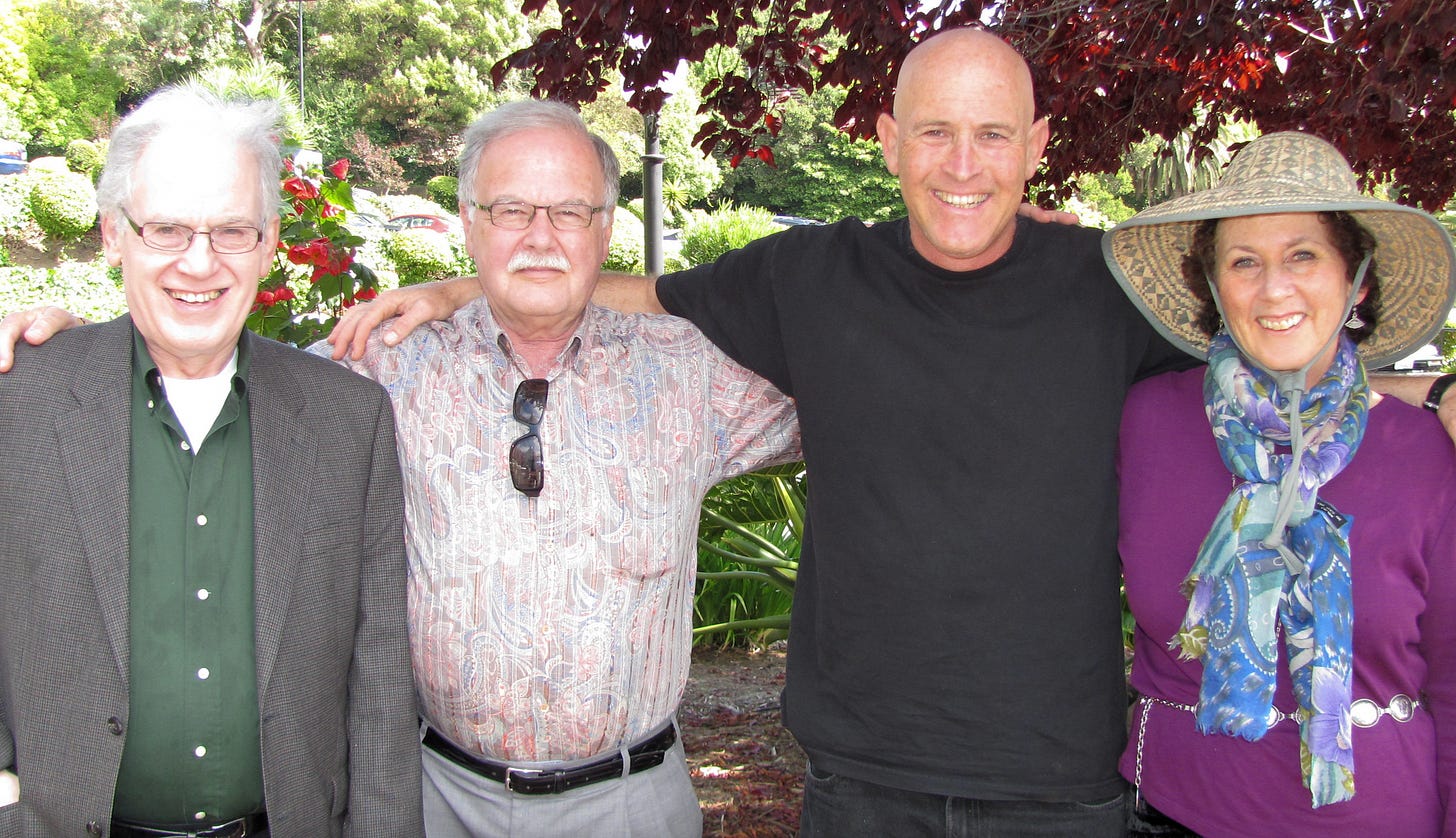
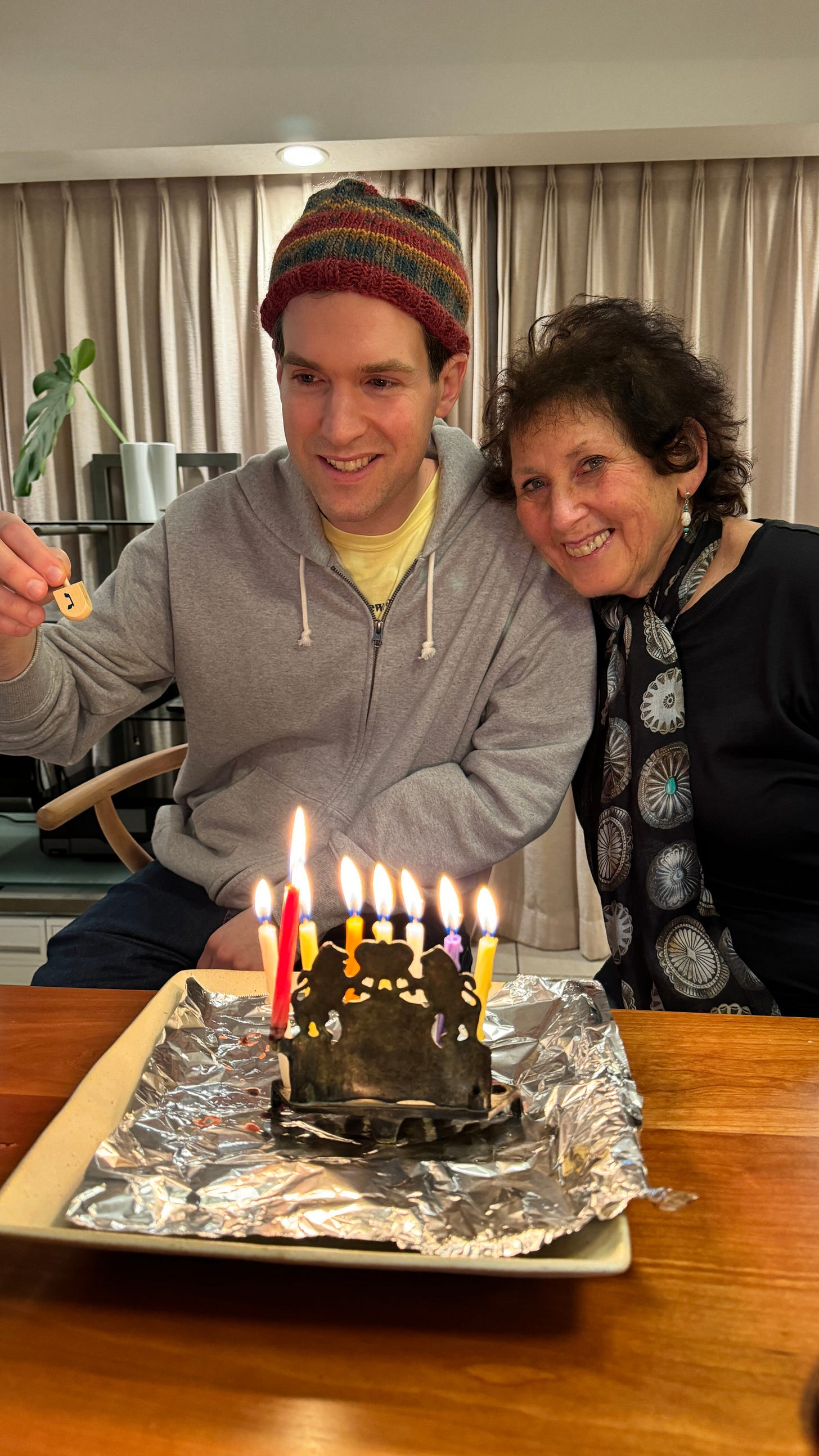
So beautiful, Ruth, and I love seeing the pictures of your family. Bringing the Menorah from Germany really touched me, such continuity and history for your family. Happy Hanukkah, my friend! ❤️ ps — the fruit cake is almost gone! 😆
I love the story and of course the pictures! I miss the celebrations we used to have when we were children but what special memories I have. When I was about 5 I desperately wanted a Tiny Tears doll. We got one present each night, of course, and each night I hoped she would be there. Finally by night 7 when she still wan't , I decided it would probably be my 8th night gift. It wasn't. I was happy with what I did get but my mother knew I was disappointed. She explained that the stores didn't have any when she went shopping but that she had ordered one and it would be delivered the next day. I sat on the front steps waiting for the L.S. Ayres truck. When it arrived, the driver brought her to me and said I couldn't open it till Christmas. I just smiled and ran inside to spend time with my Tiny Tears. Thanks for always stirring my childhood memories. Happy Hanukkah to you, Jeff and the family!